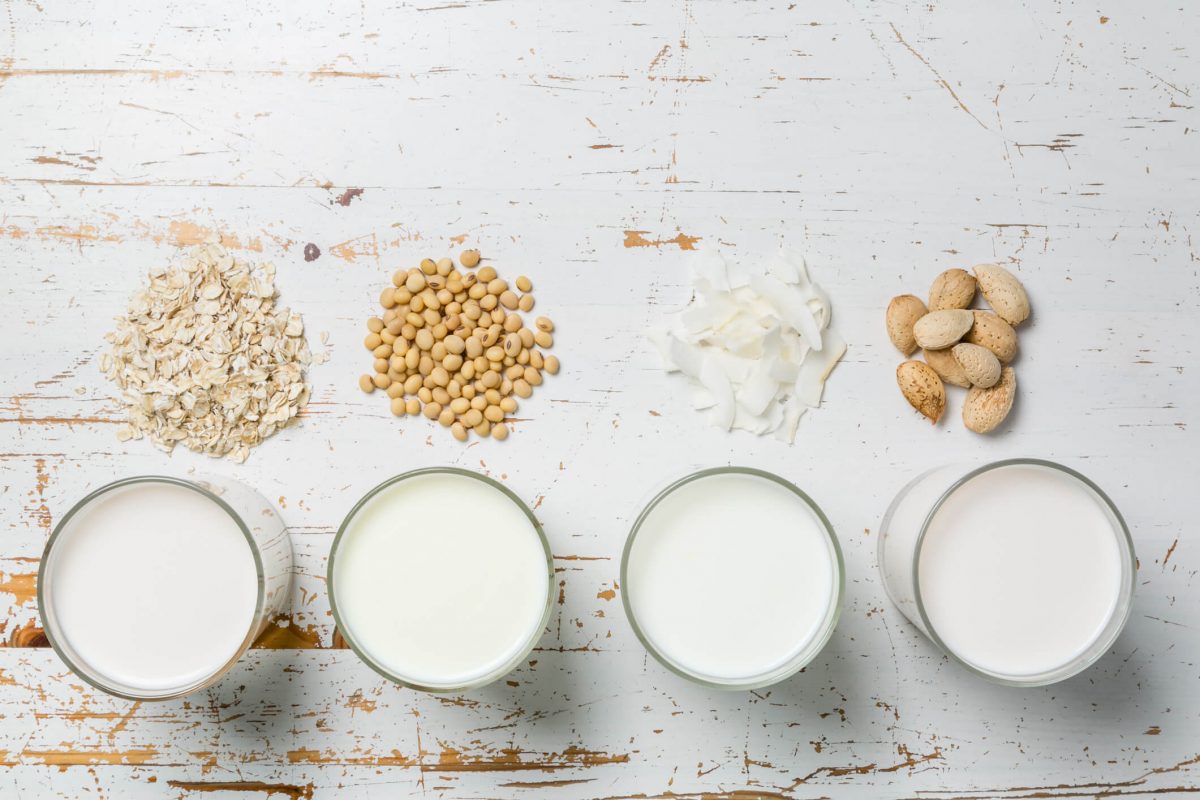Did you know what’s the most famous choice people go for in their regular diet? Let me tell you! It’s “dairy milk”, which people usually include in their diet. Consumed as a beverage, it is also put into tea, coffee, or smoothie. However, it’s a common choice for many, but you might opt not for non dairy alternatives of milk or avoid drinking milk due to certain restrictions (like allergies, infection, etc.)
Luckily, if you are trying to avoid dairy milk then there are various alternatives available for non-dairy products.
Here is the list of substitutes:
1. Soy Milk
Soy milk is prepared with soybeans or soy protein isolate, and it contains thickeners and vegetable oils to make the taste and consistency better.
It generally has a mild and creamy flavor. Though, its taste can vary between different brands. So it works as the best substitute for dairy milk to make the dishes tempting, by pouring it into the coffee or on the cereal.
The unsweetened soy milk, a cup (240ml) contains 4 grams of carbohydrates, 4-4.5 grams of fat, 80-90 calories, and 7-9 grams of protein.
In terms of nourishment, soy milk is a better substitute for non-dairy products than dairy milk. It contains an equal amount of protein, but they have almost half the amount of carbohydrates, fats and calories.
Therefore, soy milk is prepared from soy protein isolate and it can be consumed as an alternative.
2. Bamnut Milk
Bamnut Milk is one of the most versatile alternatives for milk. It can be used for your tea, coffee, baking, and cooking. It can be availed in 3 variants – Airy, Barista, and Everyday.
Airy being light and with less fat goes well with cold beverages such as smoothies, bubble tea, or even cocktails! You will love Barista for its extra creaminess. Perfect for latte art, cappuccinos & lattes, teas, and even for cooking thick & creamy sauces and desserts. Everyday is the all-rounder champion. Great for cereals, cooking, baking, or your creative urges.
3. Almond Milk
Almond milk is prepared with whole almonds, water, and almond butter. It can be added to tea, coffee, and smoothies and also used as a substitute for dairy milk in desserts or while making the food. It’s light in texture and has some sweet and nutty flavor.
The unsweetened almond milk, a cup (240ml) contains 1-2 grams of carbohydrates, 2.5 grams of fat, 30-35 calories, and 1 gram of protein. The one who is looking for the lowest calorie non-dairy milk, it’s a great choice for those who want or need to consume the lower number of calories.
4. Coconut Milk
Coconut milk is prepared from water and the white material inside the coconut. Commonly, it has a creamy and sweet flavor of coconut. A cup (240ml) contains 5.5 grams of carbohydrates, 2.3 grams of protein and 4 grams of fat, and 45 calories.
Coconut milk is not an appropriate option for those who require the intake of rich protein because it has the lowest protein value of non-dairy milk.
5. Oat Milk
Oat milk is prepared from oats and water. Oat milk is naturally mild and sweet in flavor. It can be used for cooking in the same way as dairy milk and tastes good when added to coffee, smoothies, and baked goods.
A cup (240 ml) contains 15 grams of carbohydrates, 4 grams of protein, 2.5 grams of fat, and 130 calories. It contains the same number of calories as dairy milk contains. Oat milk is low in price and it’s easy to make at home.
6. Rice Milk
Rice milk is prepared from ground white or brown rice and water. To improve its taste and texture it contains thickeners.
Rice milk is naturally mild and sweet in taste. It has a watery consistency and it tastes great while drinking with smoothies, desserts, and oatmeal or on its own. A cup (240ml) contains 9.2 grams of carbohydrates, 0.3 grams of protein, 1 gram of fat, and 47 calories.
Rice milk contains the same number of calories as dairy milk contains. It is less in protein and fat but high in carbohydrates.
7. Cashew Milk
Cashew milk is prepared from cashew or cashew butter and water. It is rich and creamy and has a slightly sweet and nutty flavor. It makes the coffee creamer and thickens the smoothies, and works as a substitute for dairy milk in the desserts.
The unsweetened cashew milk, a cup (240ml) contains 1-2 grams of carbohydrates, 0-1 gram of protein, 2-4 grams of fat, and 25-30 calories. Cashew milk has a low protein content due to this it’s not an appropriate option for people who require increased protein.
At last, cashew milk can be easily made at home without much effort.
Conclusion
Though dairy milk is a common dietary choice, we do have a great and long list of substitutes present to go for!
We have discussed the best and most suitable alternatives available for dairy milk. When selecting the milk of your choice ensure to choose the milk that is sugar-free or unsweetened keeping a check on your health.
There are various types of non-dairy substitutes that are rich in proteins, carbohydrates, fats, calories, etc. and some of them have been already discussed in the above passage.
So, now can you tell what are the various types of non-dairy products used as an alternative to dairy milk? Go enjoy your taste buds!








